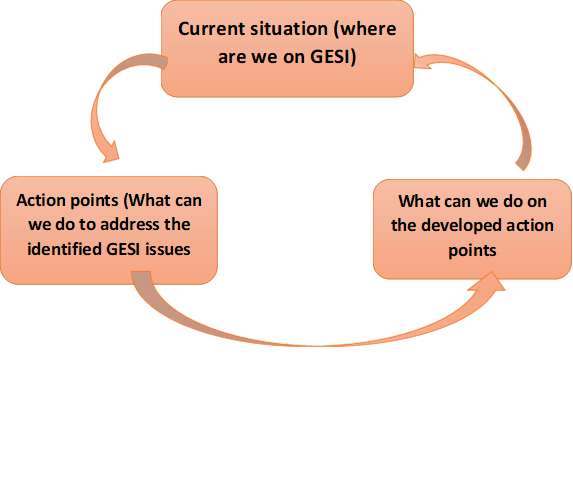GENDER EQUALITY AND SOCIAL INCLUSION (GESI)
GESI IN THRIVE PROJECT
5.0 GESI IN THRIVE PROJECT
GESI in THRIVE project is implemented along the five GESI domains i.e.
- Access: The ability to access, use, control, and/or own assets, resources, opportunities, services, benefits and infrastructures.
- Participation: The ability to participate in or engage in societal affairs and systems of power that influence and determine development, life activities and outcomes.
- Decision-making: The ability to make decisions free of coercion at individual, family, community, and societal levels.
- Systems: The availability of equal and inclusive systems that promote equity, account for the different needs of vulnerable populations and create enabling environments for their engagement.
- Well-being: The sense of agency, worth, capability status, confidence, dignity, safety, health and overall physical, emotional psychological and spiritual well-being.
6.0 IMPORTANCE OF GESI CONSIDERATION IN THRIVE
- Increases the output and potential of all gender and social groups in agricultural production and marketing activities
- Increases the contribution of all gender and social groups to the development of farming households and communities.
- Timely completion of farming and marketing operations
- Boosts motivation of all gender and social categories in agriculture
7.0 GENDER MAINSTREAMING IN THRIVE PROJECT
There are four steps that are followed when mainstreaming gender in THRIVE project as shown and explained below:
 STEP 1: IDENTIFY AND PRIORITIZE ISSUES AND CONCERNS
STEP 1: IDENTIFY AND PRIORITIZE ISSUES AND CONCERNS
- Identification is done with community’s gender categories and in collaboration with relevant stakeholders
- It is essential that all gender categories and relevant stakeholders express the issues and concerns.
- Prioritization is done using a gender responsive procedure. Priorities of each gender category is respected.
- Each project and programme should clearly show the gender issues and/ concerns it is addressing.
STEP 2: INTERNALIZATION
- To be convinced and committed to deal with the identified Gender issues and concerns.
- The objective is to own the issues and concerns hence practical and real life experiences should be used in terms of drama, role-plays, case studies and focus group discussions.
STEP 3: INTEGRATION
- This means packaging of interventions to deal with gender issues and concerns in the core business with quality participation of all gender categories.
- Development of interventions involves discussing the prioritized issues and concerns with the various targeted gender categories to come up with strategies.
- The strategies and actions are developed into a gender responsive action plan with indicators, targets and required IEC materials.
- Where a project or program cannot meet the needs, other potential sources of assistance should be identified.
STEP 4: INSTITUTIONALISATION
- Means enhancing and scaling up integration of Gender interventions in projects and programs by organizing and strengthening support structures.
- For example formation of Gender committees, desk officers to support mainstreaming of Gender interventions.
8.0 HOW TO DO A SIMPLE GESI ANALYSIS AT HOUSEHOLD OR GROUP LEVEL

9.0 HOW CAN GROUPS: FARMER FILED SCHOOL, S4T GROUPS AND CPG/CV ADDRESS VARIOUS GESI ISSUES IN THRIVE PROJECT
- Groups promotes various ways/interventions of improving productivity and increasing income in order to address food insecurity and malnutrition at household, community and national level
- Marketing of crops and livestock is promoted when farmers produce in excess. The marketing processes increases household’s income thereby assisting them to meet their daily needs.
- Groups provide a platform for women to learn new and improved technologies together with men
- Groups provides an opportunity for all groups of people (men, women, youth and people with disabilities) to be leaders
- Groups provide an opportunity for all groups of people (men, women, youth and people with disabilities) to freely express their views. In groups every member is free to contribute to the decisions of the group without being coerced for the success of the group
10.0 QUESTIONS TO ASK INORDER TO KNOW THAT GESI IS BEING INTEGRATED
- Do all members make or contribute to the decisions without being coerced?
- Are the report GESI disaggregated? Does the report show how all groups of people (men, women, youth and people with disabilities) are taking part in the project?
- Does the project interventions and workplan show how men, women, youth and people with disabilities will take part in the project?
- Are the resources of the project available for all groups of people (men, women, youth and people with disabilities)?
- How are leadership positions, power relations and control allocated between men, women, youth and people with disabilities?
